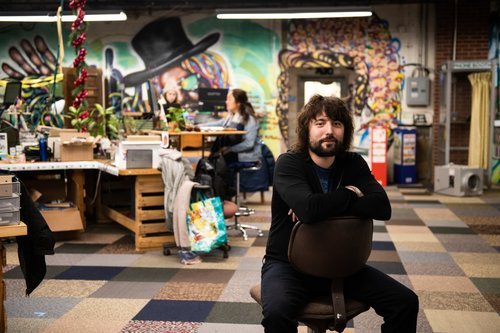The world’s biggest brands have a garbage problem. This man can help

The world’s largest consumer goods companies have a big problem: The plastic waste that piles up in landfills and oceans has their corporate logos all over it.
To try to fix it, they’re increasing recycling efforts, sponsoring beach cleanups and switching up packaging materials, among other things. The most radical effort, though, is also the hardest to pull off: Get consumers to switch from single-use to reusable packages.
It may seem impossible, but Procter & Gamble, Unilever, Nestlé, Clorox and PepsiCo are all trying it out, thanks to Tom Szaky.
Szaky is the founder and CEO of TerraCycle, a recycling company based in Trenton, New Jersey. He’s also the driving force behind Loop, an innovative service he likens to a 21st century milk man. Launched in May, the service sells brand-name goods like Tide detergent, Pantene shampoo, Gillette razors and Häagen-Dazs ice cream all in reusable packages. Participants pay a refundable deposit for each package, use the products, throw the empty containers into a Loop tote and send them back to be cleaned and refilled.
The stakes are high for all involved. For Szaky, failure could mean the loss of a significant investment and his reputation as a green business whiz. The companies, too, poured time and money into the project. For them, failure means one fewer solution to their plastic waste problem.
It’s “the biggest risk we’ve ever done,” Szaky told CNN Business’s Rachel Crane. “It’s in every way a massive gamble.”
But Szaky is no stranger to risk.
Can one man bring back reusable packaging?
Durable packaging fell out of fashion decades ago, when cheap, disposable plastics replaced glass bottles and containers. Today, reintroducing the public to a system of reusable packaging is a tall order. Consumers have become accustomed to the ease of quickly tossing things away. Reusing items, however, requires them to take an extra step to preserve the packages. That’s why, when Lisa McTigue Pierce, executive editor of Packaging Digest, heard about Loop, she was skeptical.
“When I first got the information, I thought to myself, ‘Wow, this is never going to take off,'” she said. But then she had another thought. “This is Tom Szaky at TerraCycle … one of the best marketers I have ever seen,” she said. “If anybody could make this work, it’s going to be Tom.”
That’s because Szaky has a history of pulling off the improbable.
Eighteen years ago, as a freshman at Princeton, he came up with the idea to sell worm poop as a natural fertilizer. Szaky turned it into a business, and soon dropped out of college to make it grow.
Related: See the 20 Risk Takers pushing global business forward
He convinced Princeton undergraduates to work for free, and persuaded older friends to leave their steady jobs for leadership positions at the company. In its early years, leaning on paltry funds from investors and winnings from entrepreneurship competitions, TerraCycle teetered on the edge of collapse.
But then Szaky convinced big-box retailers like Home Depot and Walmart, which were already stocking established fertilizers like Miracle-Gro, to take a chance on his product. It’s easy to see why they might have turned him down. TerraCycle’s plant food was not only made from waste but packaged in waste, too: used soda bottles and discarded caps.
While Szaky was chasing meetings with major retailers, other eco-friendly companies and environmentalists were swearing to never work with the likes of Walmart. But Szaky has always believed that in order for his green products to make a difference, he would have to work with — not against — corporate America. He’s taking that approach with Loop today.
“My goal consumer is someone in the middle of America who may still even not be convinced on climate change, because if I can get him to participate, then we can really change the world,” he said. “This is why we’re working with the largest manufacturers, the largest retailers. Because that is what America likes today.”
Szaky has always been able to get people’s attention.
In 2003, when he was just 23 years old, the Canadian Broadcasting Corporation ran a short documentary about TerraCycle. In it, Szaky talks openly about his fears and the risk he’s taken, revealing that he asked investors for money to build a facility that would help fill nonexistent orders, and that he was pushing a new product he wasn’t sure worked. His openness is charming, as is his obvious commitment to the cause: Szaky lugs furniture left behind by Princeton students back to a dilapidated house dedicated to putting up staffers over the summer, and refuses to buy any new packaging — or do anything the “normal” way. Three years later, at age 26, Szaky had landed on the cover of Inc. Magazine, which lauded TerraCycle as “the Coolest Little Start-Up in America.”
Since then, he’s written four books and maintained his status as a media darling, even launching a TerraCycle reality show called “Human Resources” on the now defunct network Pivot. It lasted for three seasons.
Szaky, now in his late 30s, is still able to punch above his weight. Two years ago, at the ritzy World Economic Forum in Davos, Switzerland, he landed a spot on stage with the CEOs of Walmart, Alibaba and Heineken to discuss the future of consumption. And he is still successful at enticing employees, some of which have taken major pay cuts, to work out of TerraCycle’s modest headquarters in Trenton, New Jersey, which is decorated with trash.
Heather Crawford, vice president of marketing and eCommerce for Loop, left a managerial position at Johnson & Johnson to join TerraCycle in November. “Tom is a visionary who genuinely dreams about a waste-free world,” she said. “He has these idealistic goals that he drives the whole team towards, and he asks people to do the impossible.”
Over the years, TerraCycle evolved, moving on from fertilizer to transforming items that are difficult to recycle into something new. Today, TerraCycle repurposes used batteries, backpacks, coffee capsules, cooking oil and more. The company is doing well: In the first six months of 2019, TerraCycle’s US operations reported net income of $1.8 million on revenue of $11.2 million. Sales were up 19% from the same period a year earlier, driven in part by new recycling partnerships with Gillette, Williams and Sonoma, Reebok and General Mills.
In September, TerraCycle also launched a car seat recycling event with Walmart. The event proved so popular, Walmart shut it down early, citing an “overwhelming response.”
“We have a successful, profitable, growing business,” Szaky said. The new venture could change that. With Loop, “we are sort of putting that on the line,” Szaky noted.
“We’ve put close to 10 million of our own dollars into it. We’re going to put even more,” he added. “Any big idea requires that leap.”
Convenience is key
In order for Loop to work, it has to be easy for consumers.
Today, consumers demand convenience, noted Pierce of Packaging Digest. “Without that — even with Tom and all of his strong partners, the consumer packaged goods companies — I don’t know that it would work. Especially when you think of the cost premium for this service,” she said. “That convenience angle is everything.”
Although Loop products are designed to cost about the same as their traditional counterparts, users do have to put down a deposit when they make a purchase online. The deposit can range from 25 cents to $10, depending on the item.
Consumers get it back unless they break, keep or lose the package. But some customers may be unwilling or unable to put down a deposit upfront. Individual deposits add up, and if people use the service for long periods of time, they won’t get that money back for a while.
Szaky, who recognizes that the deposit could be a roadblock for some, aims to make Loop as convenient as possible. His hope is that customers will toss their empties into a used tote just as they would toss their empty containers into the trash. There’s no need to wash them first: Loop handles the cleaning. And thanks to the rise of e-commerce, consumers see delivery as the most convenient option already.
Plus, in 2020, Loop products are slated to be available in major retailers like Walgreens and Kroger. That means, in addition to at-home pickup and delivery, consumers will be able to buy and drop off Loop products in person. Ultimately, Szaky wants to build a big enough network to allow customers to pop into one local store to buy a Loop product, and swing by another to drop a Loop package off.
For Szaky, ubiquity will be a marker of success.
“I would sit back and start feeling like we’re doing it when I see Loop pop up unconsciously,” he said. “I would feel we really got there where it’s a common question of, ‘Hey, would you like that in disposable or durable?'”
Szaky thinks things are moving in the right direction. Companies that committed to join the pilot with just a few products have added others, and more are in the pipeline. Loop currently includes 120 products and the service adds an average of two new products every week.
When new brands join, their competitors tend to hop on board, as well, afraid of being outdone. For example, Loop launched with reusable Häagen-Dazs ice cream containers, and soon “the biggest ice cream companies, their competitors, called us and said, ‘How do we get involved? How do we go even bigger?'” Szaky recalled. This is “what competition is supposed to do, is keep making products better and pushing each other.”
Today, Loop operates in parts of France and the East Coast in the United States, and is used by more than 10,000 people. Orders are continuously increasing each week, and repeat order rates are strong, the company says. Next year, the service will launch in London, Toronto and Tokyo, as well as parts of Germany and California.
Scaling up so broadly and so quickly is risky, however.
“One of the things that keeps me up at night is building out the actual operational scale-up plan,” said Crawford.
A lot had to happen just to get Loop to the pilot phase. Companies had to develop new durable containers that were easy to clean and use. It took Nestlé 15 tries to get that envy-inducing ice cream container right. Szaky and his corporate partners have to make sure that packages are delivered, collected, cleaned and reshipped in a timely manner — a complex logistical proposition, especially considering how many different companies are involved. Loop currently uses one cleaning facility in Southeast Pennsylvania to process its US-based orders. But as it continues to expand, TerraCycle says it will need to add more facilities in other parts of the country.
For now, the project is small, and the Loop team is taking careful notes on consumer behaviors, complaints and preferences. But if Loop gets as big as Szaky wants it to, the system will have to work, impeccably, on its own.
“All of the moving pieces, logistically, operationally, new facilities in all of these regions and all of the steps and pieces that need to happen in the expansion plan is something that’s going to take a tremendous amount of time and attention from our team, and also support from partners,” Crawford said.
If things go wrong — orders get held up, items are out of stock, or people feel burdened by yet another shopping platform — people could give up on the idea of reusables.
Historically, consumers have often valued convenience over the environment. Starbucks, for example, has tried for years to get consumers to use reusable cups, selling durable versions of their cup for a few dollars and offering discounts to customers who bring their own mugs. But the company has consistently found that despite its efforts, just a small fraction of consumers actually bring their own cup to the store. Can Loop finally crack the code, convincing consumers to switch to reusables?
Meanwhile, the clock is ticking: companies participating in Loop won’t wait forever for the concept to prove out.
Eventually, “their primary concern is going to be return to shareholders,” Crawford said. “At some point in this process it needs to become profitable.”
Experts are optimistic that this time, things could be different.
With Loop, Szaky’s “timing is impeccable,” said Pierce. Consumers are looking for solutions to the plastic waste crisis, and Loop could be a good one. Ultimately, companies may go in a different direction, like biodegradable wrapping or package-free grocery aisles instead of reusable containers.
No matter what, big corporations will have to seriously reconsider the way their goods are being sold.
Unilever said on Monday that it plans to cut its use of non-recycled plastic in half by 2025. To deliver on that promise, the company will have to collect over 660,000 tons of plastic per year, and continue to innovate its product line. In addition to reusable packages, Unilever has tried out soap-like shampoo bars, bamboo toothbrushes and cardboard deodorant sticks, among other things.
“The challenge around packaging is not going to go away,” said Tensie Whelan, director of NYU Stern School of Business’s Center for Sustainable Business. “Growing regulatory scrutiny of it is not going to go away. Growing consumer concern about it is not going to go away. And growing cost of waste disposal and the environmental impact is not going to go away.”
Szaky knows that his partners are in desperate need of a solution. When he first approached companies about Loop, he targeted ones that were featured on a Greenpeace list of worst plastics polluters, because he knew they had a potential public relations crisis on their hands. He’s hoping that the scope of the problem will inspire the type of changes needed to make Loop a success.
“Loop is a gargantuan ask,” Szaky acknowledged. “We’re going into a Procter & Gamble and saying, ‘reinvent the packaging of these world-famous products completely, build production lines to fill this reinvented package, oh, and, by the way, I have no proof if anyone’s going to buy it at all.'”
And Szaky knows that people are paying attention to what he’s doing.
Loop has “a very big responsibility,” he said. “I think a lot of people are going to think about whether there’s a future in reuse by whether we succeed or not.”
Correction: An earlier version of this article did not specify that the revenue and income numbers are for TerraCycle’s US operations only.



